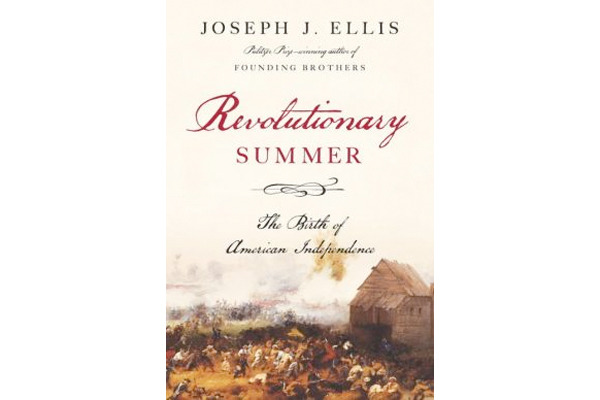Ellis on Revolution

Joseph J. Ellis’s tenth book does not disappoint. I mean it in the best possible sense when I say that "Revolutionary Summer: The Birth of American Independence" reads like a good yarn by a kindly uncle who, the listener comes to feel, may well have been a participant in the events he describes.
Ellis’s story is about the battle for Manhattan and for the hearts and minds of fledgling Americans in the summer of 1776. Fully one in five colonists were Tories during the American War for Independence, and many others were what pollsters today would term “undecided.” The fortunes of war and politics were intimately intertwined.
Ellis, a scholar of the American Revolution and winner of the Pulitzer Prize for “Founding Brothers,” captures this critical moment in our history with clarity, as well as a soft-spoken authority that is endearing. At one point, in positing his overarching thesis for "Revolutionary Summer," the author concedes, “at least in my version.” What’s not to like about a distinguished historian who is humble and can turn a phrase on a dime?
The author’s contention is that from May to October of 1776, the American rebellion flowered and the rebels managed to avert twin political and military disasters at a time when the Continental Army was on life-support — actually, it would remain so for the duration. It was also a time when Americans were still largely uncertain as to what exactly they were doing and who they were or would become. “Beyond independence, Americans had no consensus on what being American meant,” Ellis asserts.
The Revolutionary War was, in essence, an insurgency and once George Washington came to realize that (many of his subordinates did so before he did), things would go better for the “Cause.” Indeed, many Patriots fervently believed that their righteous mission would overcome all setbacks on the battlefield. The colonies were simply destined to be free. Even if this were true, winning battles – or not losing them – was still preferable.
Washington had learned soldiering in the ever-so-formal European fashion and that was how he set out to conduct this American war. There would be pitched battles, and honor was no small consideration in deciding when and where to fight. His ragtag army would defend Manhattan against a far larger and experienced British force that had total control of the sea (with more than 400 ships and 1,200 cannons). Washington believed it would be like Bunker Hill, where British attackers suffered dearly, only more so. It was a really bad idea, one that events and his staff eventually disabused him of.
Thankfully for America, the British under the Howe brothers (William by land and Richard by sea) failed to take advantage of Washington’s misstep in placing his army at their mercy on a smallish narrow island. Although British soldiers may have been routinely bayoneting American prisoners, the Howes had, as part of their official portfolio, offered an olive branch to the recalcitrant colonists. To keep the prospects of reconciliation alive, the Howes’ strategy was to give the locals a proper spanking as opposed to annihilating them. Unlike Ulysses S. Grant during the Civil War, the Howes didn’t understand that to win, they needed to destroy the insurgent army and the rebels' will to fight, not simply capture territory.
Consequently, the American army was allowed to retreat to fight another day, and Washington would realize that this was how he needed to conduct the war: like the insurgent that he was. Running away was as important as standing and fighting, maybe more so. Americans were adept at both, Ellis documents.
“Washington, based on the lessons learned at New York, would never again allow the survival of the Continental Army to be put at risk,” the author explains. “Though it ran counter to all his instincts, he now realized that his goal was not to win the war but rather not to lose it.” The Brits would grow weary of traipsing about a large and uncontrollable land mass and go home. In his preface, Ellis draws parallels with modern America’s experiences in Southeast Asia and the Middle East.
One compelling reason for Washington’s strategic epiphany was that his army was threadbare in the extreme (more than a few were armed only with spears), and the 13 states were not willing to spend the money necessary to make it a formidable force. Americans, it turns out, were averse to taxation period, with or without representation. Washington was appalled by this unpatriotic parsimony.
After the war, taxpayer stinginess extended to the Continental Army veterans, who had been promised generous pensions to induce them to enlist. The public fancied the myth that volunteer militiamen had won the day as opposed to a standing army of underpaid regulars. “Americans needed to believe that they had enjoyed an Immaculate Conception, that they had given birth to an independent American republic without resorting to a standing army of regular soldiers,” Ellis writes.
Ellis's treatise extends beyond 1776: After not losing the war, America clearly was still a work in progress. Thomas Jefferson’s stirring beginning to the Declaration of Independence – what Ellis calls “the most important fifty-five words in American history” – deftly grafted a shoot of radicalism into what was essentially a conservative revolution. Men had inalienable rights and governments derived their just powers from the consent of the governed. Were not slaves men? Were not women among the governed? Abigail Adams, for one, thought so on both counts.
Slaves would have to wait four score and seven years for the Emancipation Proclamation, the start of their journey toward freedom; women would not gain the vote for 144 years after 1776.